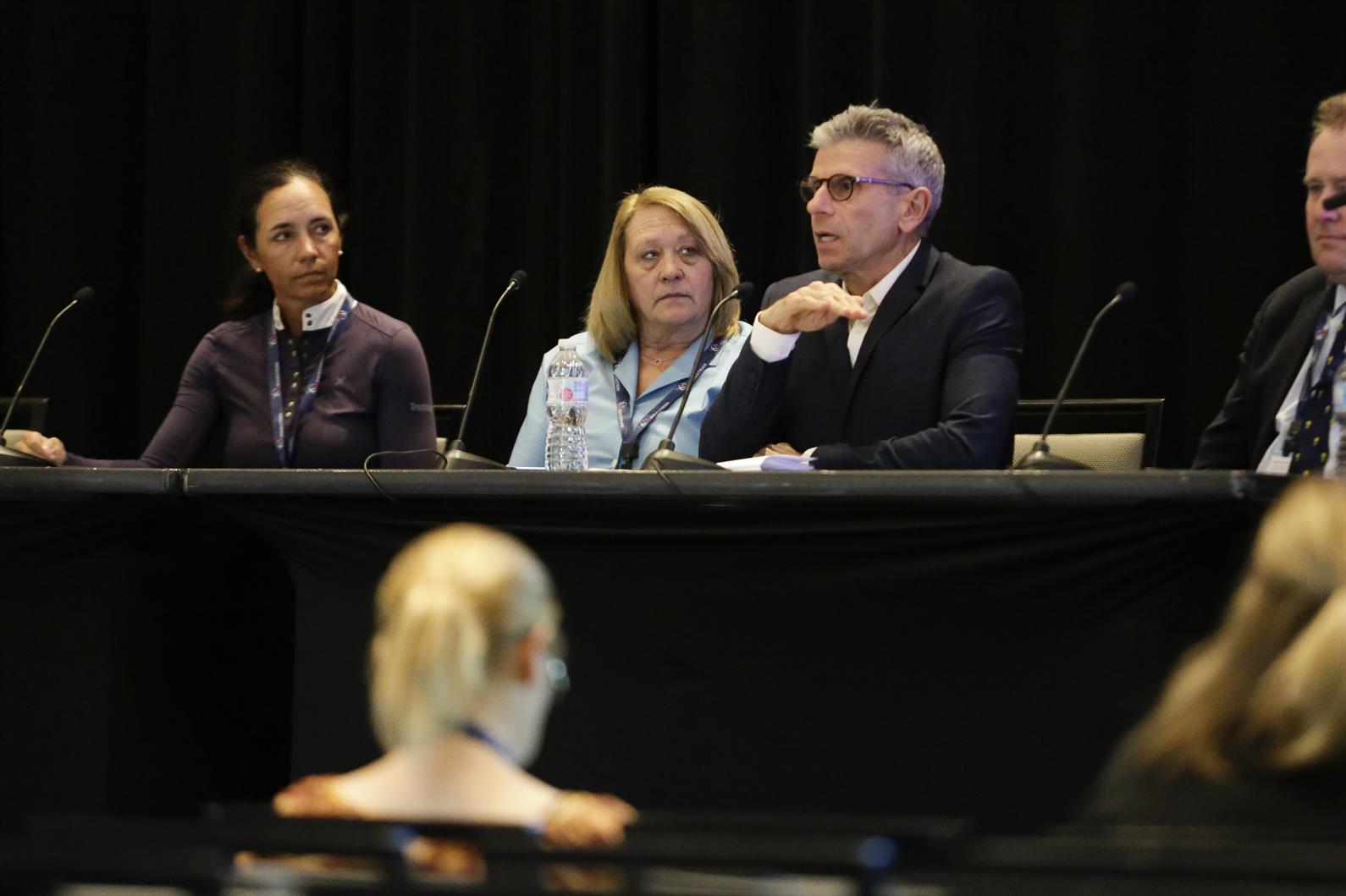During the US Equestrian Annual Meeting on Thursday, US Equestrian Director of Sport Will Connell defined his goals for sustained high-performance success. The list includes assisting in the development of young athletes and developing world-renowned coaches. These goals go hand-in-hand, and on Friday, the Coaching, Youth, and Para Dressage panelists, Michel Assouline, USEF’s Para-Equestrian Dressage Head of Coach Development and Para-Equestrian Dressage Technical Advisor, Alison Brock, 2016 Rio Olympic team bronze medalist and US Equestrian board member, Connell, DiAnn Langer, US Equestrian Youth Chef d'Equipe and Technical Advisor, and Laureen Johnson, US Equestrian Director of Para Equestrian, provided context and clarity into how to reach these goals based on opportunities provided in 2018.

United States Olympic Committee Coach Accelerator Program
Brock participated in the United States Olympic Committee (USOC) Coach Accelerator Program in 2018. During the educational coaching training, Brock learned effective communication techniques designed to enhance her coaching. She believes programs such as these have to become a critical component of coach improvement in the equestrian industry.
“I think we can do a much better job with all our programs if we had a little more focus, more from a psychology standpoint, and really understand the science of learning,” stated Brock. “Instead of just doing what we all do, and it is not that we are doing bad, but we can definitely do better. I think to stay cutting-edge, we have to keep up with our coaching practices and keep pushing the bar to be better than anyone else. It needs to be a bit formalized. Programs like this have to become part of what we are doing on a national level.”
Buenos Aires 2018 Youth Olympic Games and USOC Sport Symposium
Langer served as the chef d’equipe for the gold medal-winning North American team at the Buenos Aires 2018 Youth Olympic Games. What she took away outside the field of play increased her coaching skills. Langer’s team had never competed or worked together before Buenos Aires. However, they came together quickly as a team and broke up responsibilities for a seamless transition. In addition, they faced a language barrier with other nations. This added to the complexity, but they used sport and the love of the horse as a means to connect with others. During the games, the jumping athletes were housed with those from different sports, which taught Langer about a new subset of communication.
“What you learn from other sports and another person’s experience is extraordinary. This was two weeks of intense information. ... It taught me that sport is a universal language,” said Langer. Although the athletes could not communicate with each other, they could in sport. … If we remember that we can learn from each other and connect with each other, then you start trying to clear away the cobwebs. Sport is bigger than just us.”
Following the Youth Olympic Games, the USOC invited Langer to the Youth Sport Symposium, where she got to interact with and learn from numerous coaches connected to other national governing bodies. In addition, she studied the USOC American Development Model, designed to create positive experiences for American athletes at every level. Langer stated that coaching, identifying training, and continuing education for coaches across all sports is a priority for the USOC.
During the symposium, Langer connected with USEF Dressage Youth Coach George Williams, and they compared their coaching systems and came up with many ideas of how the jumping and dressage disciplines could interact to improve their disciplines. Langer thinks it is important to get coaches together from each discipline to help sort through each other’s issues to pave a path for success.
“We have more things alike with other sports than we know. Other sports can teach us a lot. Connecting within our own disciplines within horse sport is very important,” said Langer.
Case Study: USEF Para-Equestrian Dressage Coach Certification Program
US Equestrian para-dressage is leading the way with coach development and has launched its Coach Certification program developed by Assouline. The program, made up of the following four levels (master coach, silver coach, bronze coach, and apprentice coach) is designed to create synergistic quality coaching across the para-dressage discipline. Coaches can also be accepted into the fast-track program based on their qualifications.
“The new coaching program is there to develop better coaches but also a better system. I have always believed that a coach is not just a coach but also a networker, someone who brings a group together, that works with other professionals. To be a good coach, you have to understand your team, and you have to work with your team. [We also] arranged the program around that concept of working within a team,” said Assouline.
In 2018, US Equestrian launched the pilot program, which played a role in the success of the U.S. Para-Equestrian Dressage Team presented by Deloitte at the FEI World Equestrian Games™ Tryon 2018. Currently, 31 participants from the pilot program want to be fast-tracked into the certification program in 2019.
The USEF Para-Equestrian Dressage Coach Certification Program offers a learning opportunity for many disciplines as they work to determine if a similar program can work for them. Behind every athlete is an amazing coach, and it will take coaching programs and development opportunities, such as the ones Brock and Langer experienced, to cultivate athletes as US Equestrian works for sustained success.
Watch the on-demand video on USEF Network.
Want more articles like this delivered to your inbox every week? Sign up here to receive our free Equestrian Weekly newsletter.
This article is original content produced by US Equestrian and may only be shared via social media. It is not to be repurposed or used on any other website aside from usequestrian.org.


